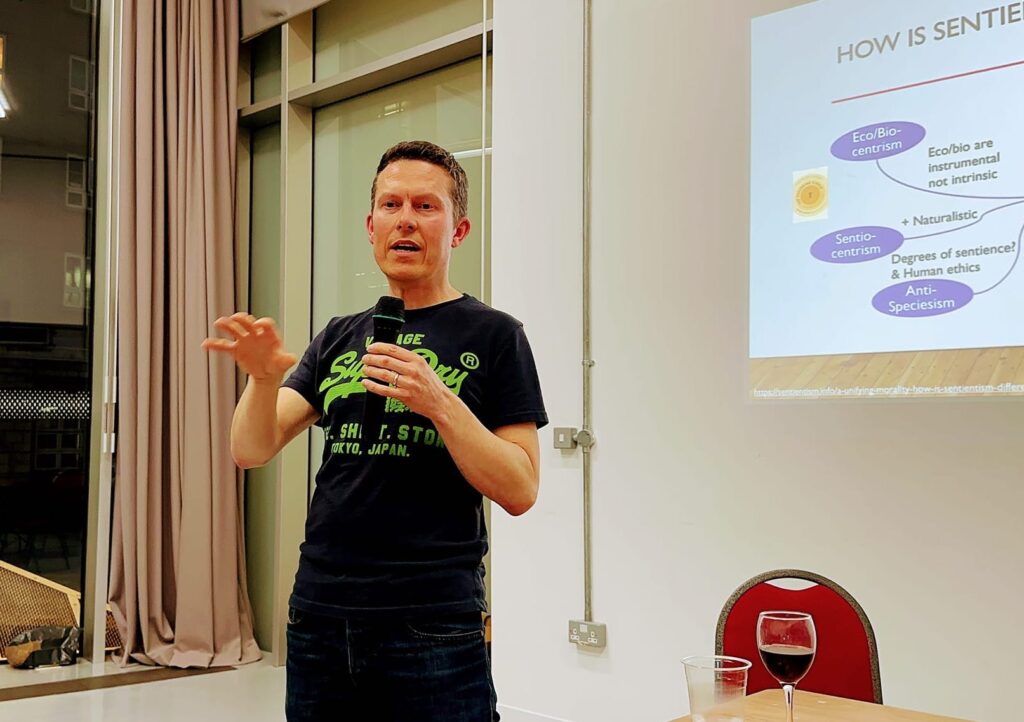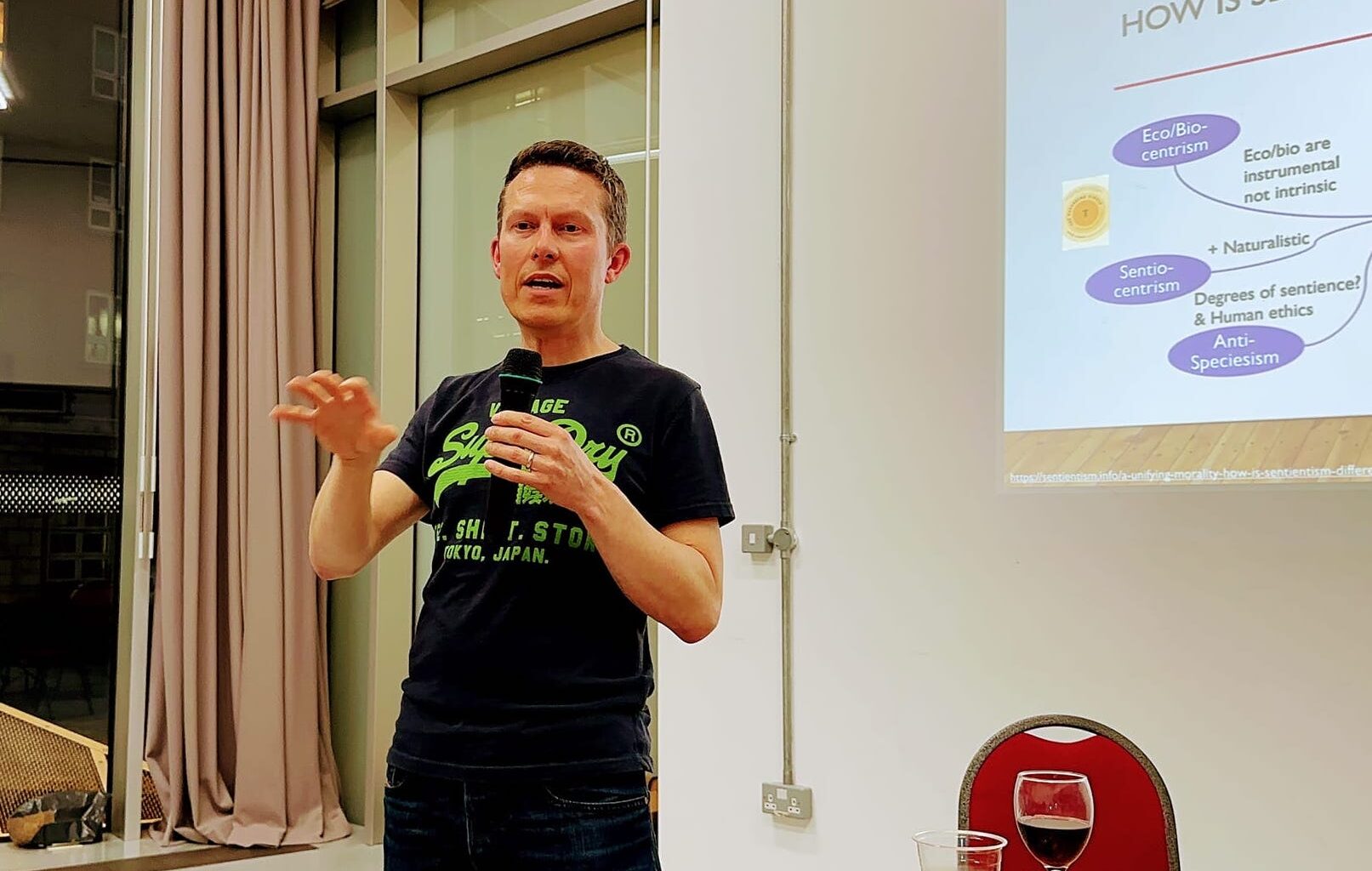Management consultancy is not the most obvious preparation for founding a new ethical system. But that is what Jamie Woodhouse was doing when he came upon the idea of ‘sentientism’, and set up a website to proclaim it as a distinctive way of life. With many parallels to humanism, sentientism is, in Woodhouse’s words, ‘a simple, potentially unifying, philosophy or worldview. It commits to using evidence and applying reason and grants moral consideration to all sentient beings.’
Born in 1971, Woodhouse studied business at Aston University, Birmingham. Although growing up in a broadly Anglican tradition, he became an atheist in his teens, and turned to humanism, attracted by its emphasis on positive moral values; this has led him, more recently, to veganism and sentientism.
Woodhouse’s podcast on sentientism has run for over 150 episodes. Guests have included the philosopher AC Grayling, the journalist Henry Mance, and Ingrid Newkirk, president of the controversial animal rights group PETA. In episode 76, the activist Peter Tatchell claimed that ‘humanism will evolve into sentientism’.
I met Jamie Woodhouse at a café in Edgware, north London. He ordered a coffee with plant-based milk, while I had a peppermint tea. In this interview, we discuss Woodhouse’s path to sentientism, what the concept actually means, and its relationship with humanism and veganism.
Is sentientism internally consistent? Is a sentientist necessarily vegan? What circumstances would justify the use of violence against people in order to protect animals? Would it matter if a species, including our own, became extinct? Can sentientism save the world?
Comments are open below.
~ Emma Park, Editor

Freethinker: How did you get into sentientism?
Jamie Woodhouse: I had a corporate career, mostly as a consultant. I still do some ad hoc consulting, but I mainly work on a portfolio of different projects that relate to charitable causes, NGO work, and open data initiatives. The sentientism project has become more and more central – it has become a personal mission.
Over the years, I came to view humanism as a combination of a naturalistic understanding of the world and a universal compassion. But it always concerned me that humanism was too centred on our own species. When I was about 25, I became vegetarian. Many years later, I began to realise that the ethical reasoning that led me to vegetarianism should, by implication, lead me to veganism. I went vegan about five or six years ago, but this also made me have another look at humanism.
The reason I care about other humans is not that we happen to share the same species, but because they have a capacity to suffer and flourish and they want to live. If sentience is the reason I care about other humans, why should I not extend that care to all sentient animals?
Is anyone else involved in the sentientist movement – if there is one?
There is a movement, but it is anarchic, informal, unorganised – no governance, no money, no membership. There are many people who are working on different aspects of it who would not necessarily label themselves sentientists. At the same time, the commitment to a naturalistic understanding of the world goes back through history, predates religion, and, I would argue, predates humanity as well. Non-human animals have, in a sense, a naturalistic way of understanding the world. They are using their senses, they are trying to explore and to develop beliefs and understandings about the world to help them survive. That is a putative sort of basic naturalism.
Another ancient source of sentientism is the idea of ahimsa, which simply means ‘do no harm’, and which is central to Buddhism, Hinduism and Jainism. Sentientism is also based on the idea that we should care about one another – this idea runs through religious worldviews as well as humanism, but arguably also predates humanity. Non-human animals often care about each other. They did so long before humanity arrived on the scene.
How far is it possible for sentientism, as a single worldview, to be consistent with ethical pluralism? Surely some moral attitudes are inconsistent with others?
Sentientism is pluralistic in the sense that there are lots of different ethical systems you might apply once you adopt a ‘sentiocentric’ moral scope that cares about all sentient beings. But if you have an ethical system that carves out or disregards or ignores some group of those sentient beings, then it is clearly not sentientist. Or if you have a nihilist ethical system, or maybe a morally relativist ethical system that says that some group of sentient beings do not matter, that does not qualify. You have to have universal compassion for all sentient beings. But once you do, you can apply it in many different ways.
Does ‘universal compassion’ entail that we must not kill animals?
I have tried to suggest that we set some form of baseline – a minimum degree of compassion for one another. We would expect this compassion to be universal, not just for friends or family. Similarly, a humanist might ask what the minimum was that he or she could expect from another human. Compassion or moral consideration means that no sentient being should be needlessly harmed or killed. That is the suggested baseline.
What does ‘needlessly’ mean? What about animals that can harm humans, such as mosquitoes, poisonous snakes, or lions?
Many people would agree with the naturalistic commitment of sentientism in theory and many people will agree with the sentiocentric commitment in theory. But when it gets to the implications, it gets tough. Just like humanism, sentientism does not have all the answers – it is not a complete ethical system. It just says that we should have serious moral consideration for every sentient being that is involved. There might well be situations where we would need to harm or even kill other sentient beings – but as with harming or killing humans, we would need a strong justification.
Some sentientists will argue that all sentient beings are equal and will push for an egalitarian approach. Others will argue that even if we have a universal compassion for all sentient beings, there is still an ethical basis by which we might differentiate between them.
What would an ethical basis of differentiating between animals be? Something like a hierarchy of levels of consciousness?
That is probably the most common way of doing it. People might look at factors like longevity, richness of experience, the different types of interests that different beings can have, and they might use that to apply some form of differentiation that could guide their approach in difficult situations.
Some animals can, of course, flourish more than others. In particular, humans can flourish and have experiences to a much higher degree than any other species that we know of – can’t they?
A naturalistic and scientific approach will help us understand whether that is true or not. Different sentientists will disagree, but in my view, there are types of experience, interests, needs, that humans can have that non-humans probably do not have – just as there are types of experience that a dolphin or a bat might have that we cannot. We can experience existential angst. I can worry about things that other animals might not. This is important and valid; we should use a scientific approach to determine how far these differences hold.
However, it can work the other way around too. Suppose you were to rewrite the Universal Declaration of Human Rights as a Universal Declaration of Sentient Rights. The right to education might seem not to make sense for non-human animals. But if you think broadly enough about education, maybe it does – the right of a mother to teach her children how to live as an animal, in a way, is a right to education. As to the rights that are the most fundamental to humans – the right to family life or to food and shelter, the right not to be tortured or killed – these foundational needs and interests are relevant to all sentient beings because they are so central to our common evolutionary history. At the same time, humans have ways of mitigating suffering that are not available to non-human animals. So it is possible that their experiences of pain might be worse than ours.
Peter Singer has views about degrees of self-consciousness and ‘personhood’ that are similar to sentientism. On this basis, he has argued that infanticide could be morally acceptable in some circumstances. Would you agree?
This is another area where ethical pluralism comes in: people answer in different ways. My view is that the best way of approaching these situations is to genuinely and deeply consider the best interests of the being we are talking about in every respect. I can imagine situations in which it would be in the being’s best interests for their life to be ended. Or there are situations where individuals choose that for themselves. The best we can do is to imagine ourselves in their position and ask ourselves what we would want – and have some humility about it. But that does not mean that sentientism is going to answer every question clearly and easily.
Isn’t there a need to work out some generally applicable principles?
The danger is that the desperation for clear principles can lead us to a position where we are more confident than we really should be. Having clear principles does not necessarily mean that they are right, or that they lead to the right conclusions. We are apes who have evolved to survive on the Savannah: sometimes we are just not going to know what the best thing is to do.
Is there a difficulty that other animals do not have compassion for one other, or for us, in the way that you are saying we should for them? How can we make sense of the fact that our relationship with them is so asymmetrical?
Universal compassion is the right starting point, but it might lead us to other principles that we then apply in our lives, depending on the ethical system we choose. If we put anything else before universal compassion, we will risk causing needless harm to some sentient beings because we have excluded them. This is a clean dividing line. If you do not warrant moral consideration, you do not warrant compassion and are outside of our moral scope. Anything can be done to you with impunity. You can be tortured, killed, treated like an inanimate rock. That is a serious exclusion. There is no logical or philosophical reason for excluding any sentient being, any suffering from moral consideration.
Does sentientism, therefore, advocate a sort of unilateral disarmament by humans – that we should give up our rights and allow animals to live without any interference from us?
In some parts of the animal advocacy and the vegan movement, activists have, understandably, come to be so cynical about the human race and our track record that they have lost compassion for humans and humanity. One of the things I want to do with sentientism is to reset that balance and remind everybody that humans are sentient beings too, and warrant serious moral consideration.
If you look at all of the habitable land on the earth, humans themselves take up less than one per cent of it. All of us, human and non-human beings, have plenty of space. What occupies most of the land is agriculture. That is one area where there is a conflict, because agricultural land takes away space from free-ranging animals. If you took all of the agricultural land we use today and switched everybody to using plant-based agriculture, it would free up three quarters of the land.
Isn’t the reason why so much space is taken up by fields, agriculture, and animal products, that there are so many people in the world? Wouldn’t a better solution in the long term be to gradually lower the human population to a more sustainable level, rather than for everyone to become vegans?
That is one approach. The latest projection is that the human population will peak at around ten billion – our growth rate seems to be flattening off already. My worry with those who suggest a more radical population reduction is that, in the past, the only way that people have achieved those sorts of population reductions was through abject horror.
There can be an interesting tone that comes through some of those conversations, where there is an implication that the people who will survive will be of a certain type and that those who will not will be of a different type.
Doubtless population control could be used as a pretext for genocide. But respectable people have also supported it: see, for example, Jonathan Franzen’s Freedom. Could not the human race agree that in the long term it would be better if we could find voluntary ways of controlling the population?
Autonomy is important, as is people’s ability to take intelligent decisions about whether to have families. But I am nervous about those downsides because I see them coming through in many debates. People start out from a good place and end up in ecofascism or somewhere extremely dark. I am not sure how we would navigate that path and I am not sure that many humans want to go down that route.
On the other hand, we cannot have indefinite population expansion.
No, but I think we will flatten off at ten billion and we will be fine. There are much easier strategies than population control which avoid its ethical downsides. There may be eight billion humans on the planet, but there are about 100 billion farmed animals just on land, and another 1-2 trillion farmed aquatic animals. If we have a population problem, we can either choose to look at eight billion humans or we can choose to look at 100 billion farmed land animals. The latter is an easier problem to solve ethically.
That is partly what leads me to think that the Earth’s carrying capacity is already much higher than what is needed to support even ten billion humans. If we freed up three quarters of the agricultural land we could rewild and put up solar and wind energy facilities, or public parks, and the carbon capture through the reforestation would be enormous. Or we could grow more plant-based food – so instead of freeing up three quarters of agricultural land, if we freed up half of it, we could double our current food production with the other quarter.
Is it not the case that population control could reduce all types of environmental damage caused by humans, whereas veganism and sentientism focus only on one particular type of damage, namely the use of land for farming animals?
It could, but we would need to think very carefully about how our economy would work in that context. Often the economy and the poorest humans are harmed when the population falls. We would need to find an intelligent way of managing that. Ethical population management and veganism could complement each other.
However, my main reason for wanting to transition away from farming animals is that this practice is needlessly harming and killing sentient beings that do not want to be harmed and killed. This is independent of environmental concerns.
How far would the sentientist distinguish between the rights of humans and other animals in particular situations? For example, what about the damage to animal habitats that is being caused by the construction of new housing developments?
It depends on which ethical system you apply. If new housing needed to be built in an area where there were wild animals living, instead of killing those wild animals, they could be rehoused or encouraged to move to another place. As far as the effect on insects is concerned, the science about them is developing rapidly at the moment. It is thought that the more social ones are sentient, but the simplest ones may not be sentient. You could also take estimates of their degree of sentience into account. We need to act with compassion for all the sentient beings involved.
Should wild animals – sentient ones, at least – be given a legal right to the land they inhabit?
Some go beyond sentientism to extend moral concern to the environment, or plants, rocks, rivers and trees. Personally, I believe that all value strictly comes back to sentience: the view that the experience of things, the feelings you and I are having every second, is the root of all value and all moral worth. I view plants, rocks, rivers, trees and the environment instrumentally. I appreciate them and care about them deeply, but only because of their impact on the sentient beings, not because a tree, a rock or a house has its own intrinsic worth. I am not sure that wild animals have the same sense of ownership that we do, although many have an appreciation for territory and the homes they build.
What would happen to all the farm animals if they were no longer farmed?
At the moment, farmed animals are force-bred. When you stop this practice, the population of farm animals will naturally come down over time. I am comfortable with the idea that the population of farmed animal species would ultimately reduce towards zero – with any remaining animals being cared for in sanctuaries.
So there would be no intrinsic harm if any particular species disappeared altogether?
There is no intrinsic value in any particular species. What matters is the existence, experience and will to live of the individual sentient beings. Often we humans value a species for aesthetic reasons, but ultimately it is the individual sentient beings that matter.
On that line of reasoning, would you be equally happy with the idea that humans might become extinct one day?
It would be a shame, because we have enormous positive potential, and I see value in our experiences, our lives and our flourishing. But again, what matters to me is individual human beings, not humanity as a species or as a construct.
Surely people have often been motivated by the desire to perpetuate the human race and improve life for future generations beyond their own death?
I think this is important to the degree that it is important to the individuals – including those potential future individuals.
Aren’t you adopting a relativistic morality?
Sentientism rejects the sort of relativism that accepts a group’s agreed ethics regardless of the harms they cause. Instead, it is trying to value the perspective of other sentient beings in the same way that they do. That standard should apply to every group.
If you take the view that what matters is each person’s experience to them, then, once that person had died – or once all people had died – there would be no more experiences to matter. Can the long-term survival of the human race be of any concern to the sentientist?
Extinction would be a shame, because there is positive value in experiences and good lives as well. I am not advocating human extinction. I would love to see humanity persist, continue and improve. Part of the reason for this is that there is catastrophic suffering in the non-human world, for example among free-ranging animals. One of the possibilities of humanity continuing is that we might actually be able to mitigate that suffering or help those free-ranging animals in some way. Many humans already do this on a small scale.
Without humanity, there is just biological evolution. And gene propagation evolution is amoral, harsh and brutal. Despite the terrible track record of humanity so far, the prospect of benefit to all sentient beings might be greater if we persist in the future than if we do not.
Would you see humans as the moral arbiters of the other species?
It is less about being moral arbiters than just being ethical and caring about morality. It is not about us as arbiters deciding one way or the other, it is just about having a motivation to help others.
I am also not suggesting that humans are the only beings that have the capacity to be moral or to care. However, we are able to use our rationality and power to extend our compassion in a much richer, more impactful way than other species. We have already demonstrated we have the power to cause greater suffering than other species – it would be good to set that right.
Must the sentientist be vegan?
I would suggest so. There are some who call themselves sentientists who disagree. They have found some way of rationalising their consumption of sentient animal products, but I think they have made mistakes. There is so much noise and hyperbole with veganism that it can feel like a club, a cult, an identity, but it is not any of those things. It is simply a philosophical stance and a set of actions that aims, as far as is possible and practicable, to avoid needlessly causing suffering, death or exploitation. When you put it like that, it is hard to understand why the idea gets so much resistance.
On the question of diet, would it not be possible to have a compromise in which everyone in the world cut down on animal products but did not abandon them completely?
Cutting down is better than not cutting down. Is it good for people to be a bit less racist or sexist, or to cut down on exploitative labour? Yes – the less of these things you do, the better. The system of farming animals is an ethical horror. Reducing can be a step along the way. If there is an argument to reduce, there is an argument to reduce a bit more and a bit more – and to bring these bad things to a complete end.
You draw an emotive analogy between eating animal products and being racist or sexist. Racism and sexism, it could be argued, are morally wrong in human terms because they involve one human harming another. But there are things about eating animal products that all humans can share in: not only in dietary terms, but also because so much of world food culture, as well as clothing and other artefacts, depends on them.
Someone who is defending racism might say the same thing – that racism benefits the racist – that supremacy benefits the supremacist. In doing so, they exclude the perspective of and harms done to those they oppress. But benefits to oppressors do not justify the harm done by oppressing others.
Intra-human and intra-species forms of oppression are very different, but there are some common themes. One is that ending bad things is better than just reducing them. Another is that we should work to end them while having compassion for those implicated and those trapped by immoral social norms – however difficult that might be.
Which comes back to the question of whether the animal’s perspective should be treated on an equal footing with the human’s.
It does not have to be equal. It should be in accordance with their interests. Being farmed for food does not accord with even a minimal level of moral consideration outside of a sustenance or a survival situation.
What about the argument that many farm animals only exist because people have bred them in order to be farmed?
This is called the ‘logic of the ladder’. If you have two choices between a being not existing at all or being brought into existence, having a short, happy life, having one bad day and then being killed for food, you might argue that the latter was preferable. But this does not work for humans, because otherwise, farming toddlers and babies would be ethical. For the same reason, it does not work for animals. The fact that we may have created them does not mean we are justified in then hurting or killing them because we enjoy the taste of their flesh – whatever deal we might have done with ourselves in advance.
Is killing a cow as bad as killing a baby?
I would not say it is, but they are both bad and needless. That is why I reject the ‘logic of the ladder’: even at the point where you walk towards a non-human sentient being with a knife, because you have bred it to be killed, that being will look you in the eyes and will not want to be hurt and killed.
What we are getting to there is the point is that sentientism does not distinguish between humans and non-human animals in the way that a human might. You do not see the human as having any particular moral claim on other humans that other animals do not have.
I would not put it quite that way. Being a member of a species does not carry any moral significance, even the human species. There might be other reasons why you would want to care in particular ways about humans, and that could be about the potential for them to do good in the future. It might be their longevity, it might be the richness of their experience. But their membership of a particular species is not in itself relevant.
You have identified two core aspects of sentientism: evidence-based reasoning and universal compassion. Where does the principle of universal compassion come from?
It can just be a choice. Sentientism is neutral about moral realism and moral anti-realism. A sentientist would reject a ‘divine command’ theory that derives moral imperatives from God or a relativism that accepts whatever a particular group agrees as moral. Instead there are sentientists who think there is no such thing as an objective moral truth, but that we construct it various ways. There are others like me who ground their morality in a naturalistic understanding of what it is to be a sentient being – for example not liking suffering and not wanting to die.
So there are different ways of answering your question. Factors could include enlightened self-interest, the benefits of reciprocity, the ‘warm fuzzy feeling’ moral behaviour can give. For people who are committed to a rational way of understanding the world, there is an attraction to having an ethics that is coherent and consistent. We do not like cognitive dissonance. If we acknowledge that we already have compassion for at least some other sentient beings, for humans and for companion animals and for some charismatic wild animals, for example, we already feel that compassion, and we choose to care about them. If we want to be consistent and coherent, we should extend that compassion to every sentient being.
Is it possible to be consistent unless you have principles against which to judge your consistency, judging, say, the hierarchy of different animals with different creative senses?
I am not saying that becoming a sentientist fixes all those problems. There is so much more complexity to work through. Sentientism does not answer everything. It just answers the question of moral scope: who should and should not be included in our moral consideration.
If the scientific consensus were that humans need to eat animal products in order to have a healthy, balanced diet, would you stop being a vegan?
I think that is unlikely.
But suppose it were the case.
I genuinely do not know. Cultivated meat will fix that problem for us. But the scenario is almost inconceivable, because meat is just a collection of nutrients – and we can get those nutrients from elsewhere. Your question is similar to asking a humanist whether, if science discovered that we could only be healthy by eating each other, they would become a cannibal.
To many people around the world, having a diet that includes some animal products, such as cheese, butter, eggs, meat and fish, is strongly preferable to a purely plant-based diet. Does this matter?
I think that, as we cultivate plant-based meat and dairy replacements, those differences will erode to nothing. In any case, marginal taste preferences and social norm compliance are not a sufficient justification to mutilate, harm or artificially impregnate non-human animals, or to separate them from their families.
Can animal testing be justified, for example, in the interests of scientific progress?
There might be situations where it is justifiable, but they are extremely rare and getting rarer all the time. Similarly, testing on humans can be justifiable in some circumstances – for example, the vaccination trials during the Covid pandemic, where people volunteered to participate in trials.
Do you think that science needs to be directed by sentientist principles?
I think everything does. A humanist would say that we should motivate even our intellectual pursuits by some sort of ethical framework. No sphere of human interest should be exempt from ethics.
Animal rights organisations such as Stop Huntingdon Animal Cruelty have sometimes been involved in violent protest. Can violence against humans to protect animals ever be justified?
I can imagine situations where it could. If I saw my neighbour torturing his dog in his front yard and the only way I could stop him doing it was to put him in a chokehold, I would do it. In the UK, if someone is hurting their pet, the police can be called out and that person will be prevented, by force if necessary, from continuing to do so. If people thought of farmed animals as they think of their companion animals, we would all be on the same page.
Your family has a rescue dog as a pet (or ‘companion animal’). How compatible is the practice of keeping pets with sentientism?
There are different points of view about this from within sentientism and animal advocate communities. Some people argue that all forms of pet ownership are exploitation. I do not agree – I think it is possible for us to have positive interspecies relationships. I would end the deliberate breeding of companion animals. But in terms of rescue animals, providing a happy home and a positive life for one that already exists can be a positive thing for the animal concerned.
Do any environmental considerations need to come into play when deciding whether to have a pet?
Yes, they do. It is like having children. Our children are going to have an environmental impact. Companion animals have an environmental impact. All life causes some impact. That is unavoidable.
Can dogs be vegans?
Not in the sense that it is a philosophical stance, but modern science shows they can thrive on a completely plant-based diet. It is becoming clearer that there is can be positive health benefits for dogs and cats from plant-based diets. There are nutritionally complete, vet approved products out there on the market today. The process of making animal-based foods is often so brutal that it destroys many of the nutrients that dogs and cats need. The animal-based food makers add synthetic supplements to put these nutrients back into their products. Plant-based producers use exactly the same supplements.
What are your personal aims in talking about sentientism to people – on your website, your podcast, or in interviews like this one?
I want to persuade eight billion humans to agree with me, thereby helping to solve all of the world’s problems. In a way, that is not even a joke. These problems seem to be caused either by a failure of compassion – we have excluded certain humans or other sentient beings from our moral scope – or a failure of evidence, reasoning and understanding. Sentientism has implications for our personal choices, our institutions and politics, from local to international. If people applied sentientist principles at every level of human endeavour and governance, that would be a good thing for us human sentients, for non-human sentients and for the world we all share.









Your email address will not be published. Comments are subject to our Community Guidelines. Required fields are marked *
Donate